In This Issue
The opinions, beliefs and viewpoints expressed in this publication are those of the authors. They do not necessarily reflect the opinions, beliefs, viewpoints or official policies of Autism Society Alberta. |
|
|
ASA – World Autism Acceptance Month

We at Autism Society Alberta are thinking of you, as each person takes part in World Autism Acceptance Month in their own way. Maybe you’re an autistic individual, a family member, or someone who works with those on the spectrum. Whatever your connection, take this time to reflect on how you can spread autism acceptance in your community, then go for it!
|
|
|
World Autism Acceptance Month
Around Alberta
Calgary
YYC World Autism Awareness Day (YYC WAAD) in Calgary has grown to be the largest of its kind in Canada! 2023 marks the 10th annual celebration, and we are excited to celebrate, to raise awareness and acceptance.
Many leading autism and disability agencies, educational institutions, and more will be in attendance. We will have food options and performers, along with the general public, families with loved ones who have autism, and individuals on the autism spectrum themselves.
Feel free to bring lawn chairs if seating is a priority for you!
The virtual event link will be shared the day before for anyone who chooses to attend from home.
Registration is free and will help us plan our day, so we have some idea of how many folks to expect. Please register HERE.
If you have any questions and/or are interested in a sponsorship, donations, or vendor table, please contact yycwaad@aafscalgary.com.

Fort McMurray
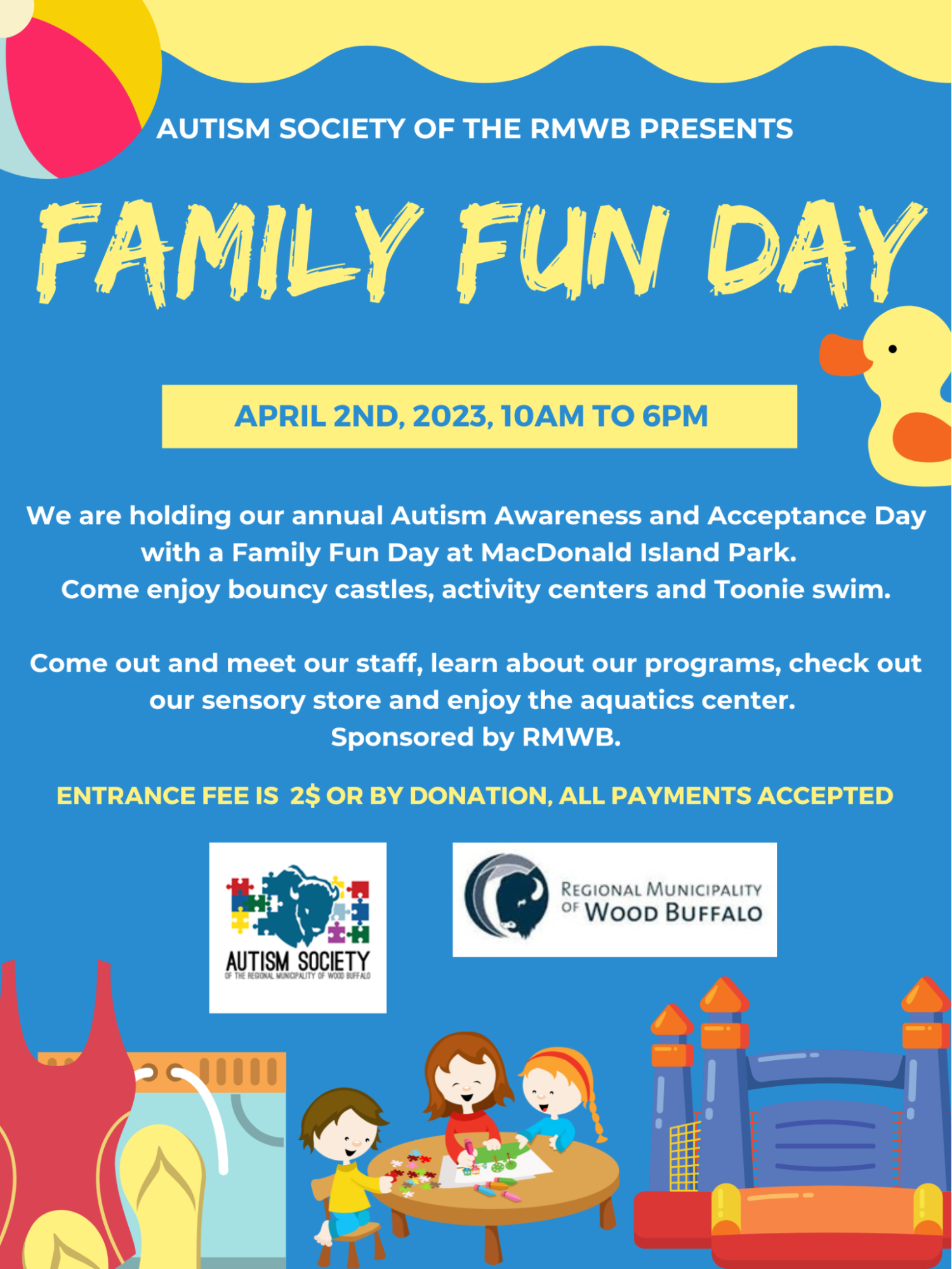
Grande Prairie

Medicine Hat

|
|
|
ASA's New Website
We are excited to announce the launch of our new website. We hope you find it accessible and easy to navigate.

If while exploring you come across any glitches, email us at webmaster@autismalberta.ca
|
|
|
Teaching Students with Autism at the Bedside:
How One Teacher Engages Students at a
Children’s Hospital
Myles Bingham
When children require medical intervention and become inpatients at the Stollery Children’s Hospital, there can be interruptions in their school attendance and academic progress. Students may feel isolated and removed from the day-to-day environment of school, friends, and the academic structure that school provides.
Once school-aged children are deemed school-ready by their medical team and family, I can bring the classroom to their bedside. I do this through collaboration with their medical team, considering each student’s environment, and centering activities around a student’s needs and interests. their medical team, considering each student’s environment, and centering activities around a student’s needs and interests.
Collaboration
As a teacher at the hospital, I interact with multiple medical units. In each unit, I discuss incoming students with unit clerks and charge nurses to determine school readiness. Their length of stay helps me determine which learning outcomes to focus on for elementary students, or course completion strategies for high school students.
For students with autism, my communication with their family and origin school is especially important. To the student, I am another new person in their space, and I have to build rapport in a short amount of time. I inquire about the student’s preferred activities, and familiar strategies that are enjoyable or calming. I focus on where in the hospital we are going to work together.
Environmental Challenges
In a hospital room, there is potential for a flood of environmental stimuli that can cause dysregulation in students with autism. A hospital room is not a quiet place. There are beeping alarms, food tray delivery, and a carousel of medical professionals monitoring progress and presentation throughout the day.
There are some environmental factors I can influence. To provide the best possible educational environment, I start by seeking feedback from the family and nursing team:
- Does the student have preferences regarding the lighting in the room that I can provide?
- Can I turn off any bright lights and raise the blinds for natural light?
- Are there proximity issues/preferences I need to be aware of?
- Am I able to sit or stand next to them, or would it be better to maintain a greater distance?
- Does the unit staff have a time slot that best suits bedside teaching with limited interruptions?
- Does the student tend to place objects in their mouth? (Is the use of teaching manipulatives that a student can interact with appropriate?)
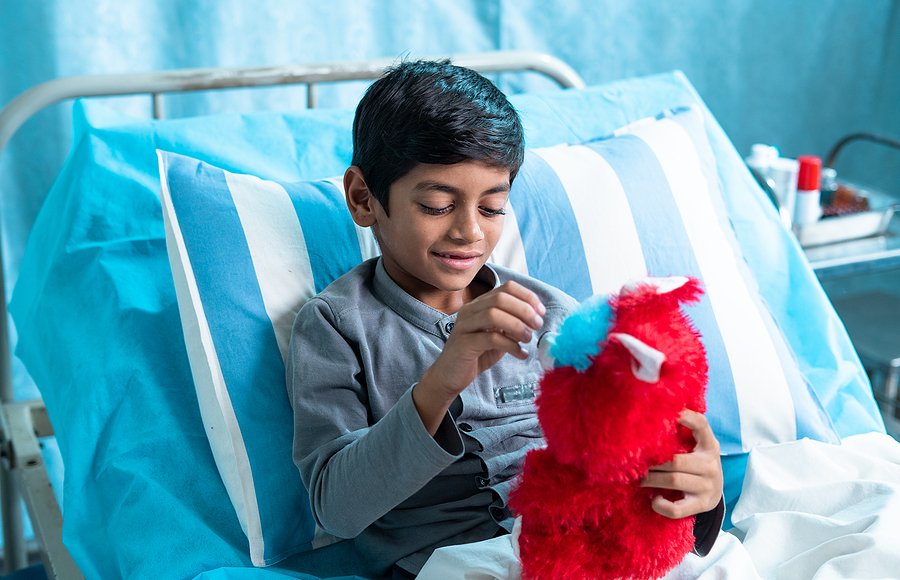
Once we have set up their learning environment at the bedside, then we engage with school programming.
Individualized Activities
In order to provide a student-centered school experience, my teaching is individualized, depending on each student’s distinct needs. Here are some recent bedside activities that were beneficial to one student with autism who was learning about the alphabet and letter sounds:
- Drawing alphabet letters in the air with hand-over-hand support
- Holding the corresponding large plastic letter in their hand as we learn about the letter shape, letter sound, and words that use that letter
- Squeezing a squishy toy that has the letter in the name, or the corresponding letter of its colour
I ensure that any item that a student touches is sterilized before and after each use.
Is there value added from the medical perspective?
“When children are unable to attend the classroom in person due to isolation requirements or medical treatments, teachers like Myles come to the bedside to provide this essential learning experience. Patients build wonderful trusting relationships with the teachers, who work hard to ensure that learning plans are individualized to each student and that this learning mirrors what is happening in their home classrooms as much as possible.”
-Allison, Hospital Child Life Specialist, and Educational Collaborator

As a bedside teacher, I appreciate the opportunity to connect with students and families during their journey to provide a sense of community, positivity, and normalcy.
Myles has a Master’s Degree in Education Psychology, with a focus on special education. He has taught children and adults with special needs in the Edmonton area for over 15 years. Outside of work, Myles volunteers with the local community soccer association and cheers on his three boys.
|
|
|
Sinneave Family Foundation

The Sinneave Family Foundation works with individuals, communities, and organizations to improve education, employment, and housing outcomes for autistic and neurodiverse youth and adults. Our goal is to see autistic Albertans ages 15+ find success in their educational pursuits, be able to get and keep a job, and live as independently as possible as valued members of their communities. In short, we want them to thrive!
To that end, we are all about Learning & Connection – hosting activities and events that provide participants with timely and practical information, valuable peer connection, and opportunities to put into practice what they’ve learned. We invite you to check out the great lineup of Learning & Connection opportunities coming in April. All of our Exploration Sessions are FREE, and you don’t have to register in advance.
*Please note: if attending in person is a barrier for you, many of these sessions offer a virtual option. See the individual event listing for details.
The Art of Parenting…with autism
(or, the art of being an autistic parent)
Thursday, April 6 from 4:00 – 5:00 p.m.
Virtual only (via Sinneave Connects)
Parenting is fraught with joys and challenges on even the best days. But when you’re an autistic parent, these things can be amplified. This new exploration session, designed especially for parents, covers the spectrum in two parts. It is for parents who are autistic, and also, for parents of both autistic and non-autistic children.
Part 1 will focus on being an autistic parent and the art of balancing what you need versus the needs of your children. Through a short presentation, discussion, and activities, participants will receive support and tips, and strategies for navigating the joys and challenges of parenting and coping in the healthiest ways possible, with a focus on self-care and compassion.
If you are an autistic parent, or the parent of an autistic child, you will benefit from this session. The virtual link is HERE.
“Phrased & Confused”
A FUN Exploration Session All About Idioms and Expressions that are Confusing
Thursday, April 13 from 4:00 p.m. – 5:00 p.m.
In-person and online
If you thought your task would be a “piece of cake,” but now you’ve “bitten off more than you can chew” and want to “call it a day”, we would understand if you were perplexed.
Phrases of Confusion (also known as idioms) are multi-word expressions that have non-literal meanings, which can often only be figured out by using contextual information.
Good communication is already difficult enough for some autistic individuals, so finding a solution for learning idioms is important. In this fun and interactive session, participants will learn about and discuss some common idiomatic expressions, and be able to understand and identify idioms, learning tips and strategies to predict the meanings of many of them. Find out more by clicking HERE.
Women’s Group
Thursday, April 20 from 4:00 p.m. – 5:00 p.m.
In-person and online
This exploration session just for women will build off of previous sessions and discussions. We will continue to provide timely information regarding topics that are important to autistic women. In a safe and welcoming small group setting, we’ll discuss these and more, share information, and enjoy valuable peer connection. First-timers are always welcome, as each session's topics and discussion is unique.
*Please note: All are welcome no matter how you identify, however, please be aware that information and resources provided are based on females assigned at birth. All gender expressions are welcome.
Find out more by clicking HERE.
Calling all High School Students! Get ready for your summer job! A 4-part series focused on preparing for successful employment!
Four Saturdays April 14 – May 6 from 1:00 p.m. – 3:30 p.m.
In-person only.
Welcome to our first-ever summer job series.This 4-part series is designed especially for autistic and neurodivergent students who are thinking about looking for a summer job and want to develop the pre-employment skills necessary to be successful.
Participants will gain a better understanding of their individual strengths and skills and how they can use these to find seasonal job opportunities that match their interests.
- Explore various types of summer jobs
- Learn about how to apply
- Craft an effective résumé and cover letter
- Practice interview skills, and
- Feel more confident in taking steps toward finding a fulfilling summer job
We’ll also work on skills you’ll need for the workplace, such as managing stress and sensory overload, and effective communication strategies in different workplace settings.
Spaces are limited, so register today by clicking HERE.
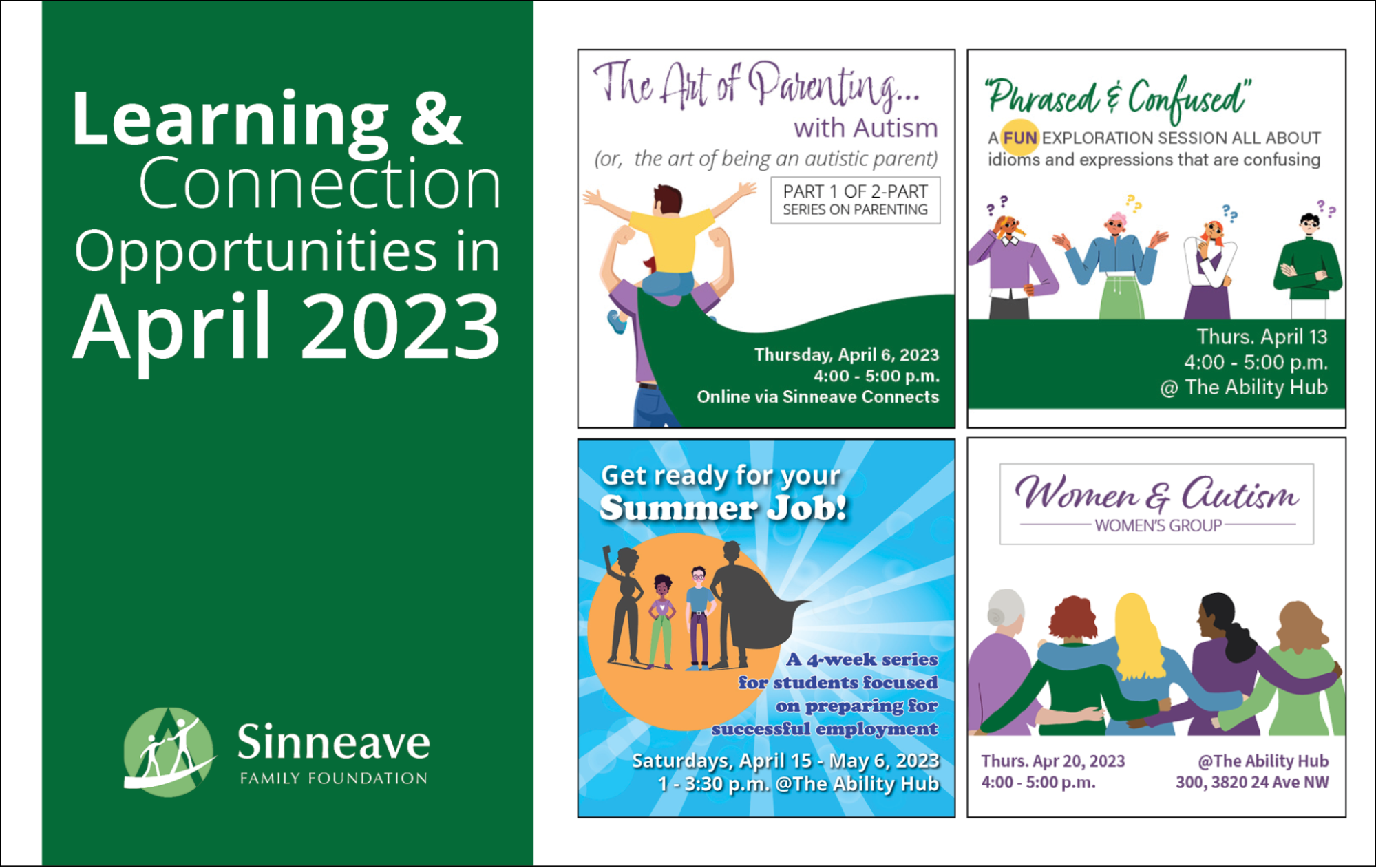
|
|
|
How I Feel When I Scroll Through Facebook Sometimes
Carmen Moore
Do I experience great days? Yes! Do I revel in our family life, and actively recognize many things for which I feel grateful? Definitely, yes! Do I know that many others have it harder  than I do? Yes! But… sometimes, when I scroll through Facebook, I begin to let that little green guy known as jealousy get the best of me. It isn’t all the time, or even regularly, but occasionally I really must acknowledge our own situation, and sometimes limitations. People say there is a grieving process that some families go through after a diagnosis, of autism or other conditions, and there is no set timetable for that process to begin or end. I don’t see it as an ‘end’, but an ebb and flow that comes and goes as each stage and age of family life comes upon us. than I do? Yes! But… sometimes, when I scroll through Facebook, I begin to let that little green guy known as jealousy get the best of me. It isn’t all the time, or even regularly, but occasionally I really must acknowledge our own situation, and sometimes limitations. People say there is a grieving process that some families go through after a diagnosis, of autism or other conditions, and there is no set timetable for that process to begin or end. I don’t see it as an ‘end’, but an ebb and flow that comes and goes as each stage and age of family life comes upon us.
I know that I am not alone in these feelings. Other people I know handle things with much more grace and positivity than I do, admittedly, but I try my best. As I scroll Facebook, I see photos of hockey teams and their gold medals. The apparent camaraderie and friendship that is built through these experiences can be key to helping develop confidence, social skills, and a feeling like they genuinely belong. They are part of a team, both literally and figuratively. I am speaking in general terms, of course.
My own child has not experienced being a formal member of a sports team, for multiple reasons. I also secretly appreciate that I don’t have to purchase all the equipment, pay all the fees, go on all the trips, fundraise, sit in cold arenas for hours on end, etc. So, there is a slightly selfish bright side to it as well, which I try to remind myself of if needed. It is this emotional circle that can go on and on in my mind, depending on where I am at, and whether I have had adequate sleep and/or coffee.
That being said, my child has other strengths that help him to shine in many other ways. I pursue events and experiences that lend themselves to that, when possible. Sometimes, I need to keep my eyes and mind on how my son perceives things, and not how I perceive they could be. He is certainly not wishing he was on a hockey team. He seems to love his life and how things are going for him in the short term as well as the long term. One time we were at a water park, as he is a brave thrill seeker. When racing up the waterslide stairs (as I try to keep up), he stopped short and said, “Mom, I want to thank you. I love my life and I appreciate everything I get to do!” This comment was unexpected and unprompted, and will rank in the top ten moments of my life. I am certain of that. need to keep my eyes and mind on how my son perceives things, and not how I perceive they could be. He is certainly not wishing he was on a hockey team. He seems to love his life and how things are going for him in the short term as well as the long term. One time we were at a water park, as he is a brave thrill seeker. When racing up the waterslide stairs (as I try to keep up), he stopped short and said, “Mom, I want to thank you. I love my life and I appreciate everything I get to do!” This comment was unexpected and unprompted, and will rank in the top ten moments of my life. I am certain of that.
We sometimes have preconceived ideas about what our child’s life should look like, but this is often not how things turn out. As hard as it is to accept some things, we only have today, and an ‘attitude of gratitude’ can help us to remember these important lessons of life. There is no set timeline, for anyone’s situation, really. Everyone has different circumstances and winding roads that bring them from one day to the next. Hold onto those sweet moments that do come. Life on Facebook is not always how things ‘really are’, anyway…scroll away and move forward.
|
|
|
Autism Society of the RMWB
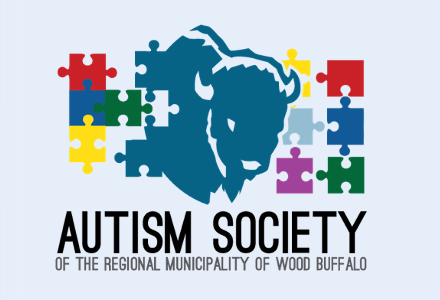
We are so excited to have Shane L. Lynch, Ph.D., coming to speak! These in-person events take place at 10019 MacDonald Ave. (Unifor Building), Fort McMurray. The Friday evening session is 1 ½ hours; Saturday is a full-day event. The Eventbrite links are below:
Friday, April 21st
Saturday, April 22nd
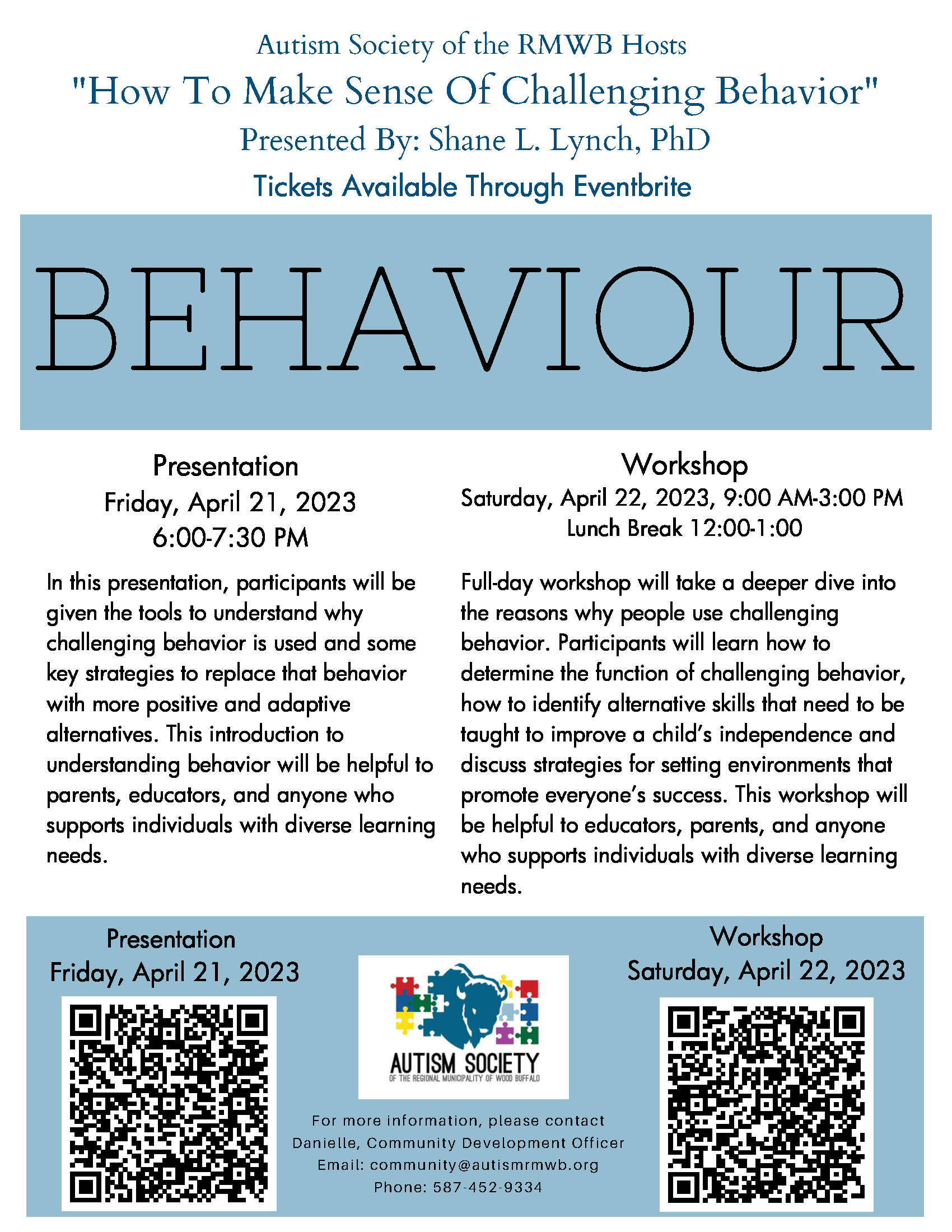
|
|
|
How Can We Recognize Depression in Autistic Individuals and Find the Support They Need?
Maureen Bennie

From the Autism Awareness Centre Inc. Blog:
While depression is a mental health condition that can affect anyone, autistic individuals are 4 times more likely than the general population to experience depression. Research suggests that up to half of all autistic people will be depressed at some point in their lives. Depression should not be ignored, and is treatable with the right support. If you or someone you know is experiencing depression, it is important to seek help. Most people will go through periods of feeling down at different times in their lives, but depression is feeling consistently sad and low for weeks or months, rather than for just a few days. Depression should not be ignored, and is treatable with the right support. If you or someone you know is experiencing depression, it is important to seek help. Most people will go through periods of feeling down at different times in their lives, but depression is feeling consistently sad and low for weeks or months, rather than for just a few days.
Depression affects people differently, and can range from mild to severe. Mild depression can make a person feel persistently low in mood; severe depression can make a person feel that life is no longer worth living. The Autistica website says that autistic people without an intellectual disability are 9 times more likely to consider suicide than the general population.
Depression in autistic people is more common during adolescence and young adulthood, and can often co-occur with anxiety. It can be difficult for autistic people to know if they are not feeling completely right, because of struggles with alexithymia. Alexithymia is a term that is used to describe when someone has difficulty identifying their feelings, or more specifically, identifying and describing their emotions. Researchers have found that one in 10 people can experience alexithymia, and these rates are even higher in people that are neurodivergent, have experienced trauma, and/or have a mental health diagnosis.
In 2017 in the UK, the Know Your Normal campaign was launched. A toolkit was designed, to help young people outline what their ‘normal’ is, so they can explain to those who support them when they aren’t feeling themselves. You can read Ambitious About Autism’s research report about young people’s experience with mental health issues. You’ll learn things such as 90% of autistic youth experience a lack of comfort in disclosing mental health issues to educational professionals. Two-thirds said that if they did ask for help, they had little or no confidence they would get what they need.
What are the signs of depression?
The National Autistic Society lists the following symptoms on its website:
Changes in mood
- Continuous low mood or sadness
- Feeling hopeless
- Having suicidal thoughts or thoughts of self-harm
Physical changes
- Changes in appetite or weight
- Disturbed sleep
- Lack of energy

Changes in how you connect with others
- Avoiding contact with people
- Difficulties at home, work or with family
- Neglecting hobbies or interests.
Other symptoms experienced more often by autistic people can include:
- social withdrawal
- an increase in repetitive behaviors
- a change in interests
- more frequent meltdowns
- an increased risk of self-harming or suicidal thoughts
What are some of the causes of depression?
Depression can be experienced by autistic people due to:
- masking
- burnout
- alexithymia
- experiencing stress or trauma (such as bullying)
- isolation/loneliness
- a family history of depression
- drugs, alcohol or medication
- other mental or physical conditions
- a lack of resources to provide adequate support
- rumination
Where do you find support?
If it doesn’t help to talk with a trusted person in one’s life, and more support is needed, start by speaking with a family doctor (GP). A General Practitioner may be able to suggest some self-help strategies, such as regular exercise, or getting outdoors. They may also be able to make a referral to a counsellor, therapist or prescribe medication.
There are different types of therapies to help with depression, such as:
 Any treatment or therapy should be delivered by someone who has an understanding of autism and experience in treating autistic individuals. Any treatment or therapy should be delivered by someone who has an understanding of autism and experience in treating autistic individuals.
What are some mental health coping strategies?
Different strategies will help different people when they are experiencing depression. These strategies, listed in the CAMH (Centre for Addiction and Mental Health) booklet, Depression and Autism, were created by youth to support youth.
- Make sure you are eating and drinking enough. Keep “safe” food close at hand.
- Take time to recharge your social batteries. Know what activities drain or give energy.
- Spend time in a safe and comfortable environment. (A space that is quiet and predictable.)
- Find creative ways to communicate other than having to use words, such as through drawing, music, dance, photography, or writing.
- Have a simple goal to accomplish or routine to follow every day.
- Have a safe person that you can trust and confide in.
For more information on the topic of depression and autism, I highly recommend reading the booklet Depression and Autism, created by the CAMH – Cundhill Centre for Child and Youth Depression. It is an outstanding resource aimed at young people aged 14–25.
Further Reading and Resources:
The deep emotional ties between depression and autism
In autism, depression takes on unusual forms
How to Recognize When an Autistic Adult is Depressed?
6 Tips to get you Through an Autistic Depression
Autism Mental Health Literacy Project (AM-HeLP)
|
|
|
Bill S-203 Passed!
We are excited to share that on Tuesday, March 28th, 2023, Bill S-203, "An Act respecting the federal framework on autism spectrum disorder," was passed in the House of Commons, receiving unanimous all party support.
The Bill was introduced in the Senate by Senator Leo Housakos, with the intent to "provide for the development of a federal framework designed to support Autistic Canadians, their families, and their caregivers."
For more information -
https://www.autismalliance.ca/bill-s203/
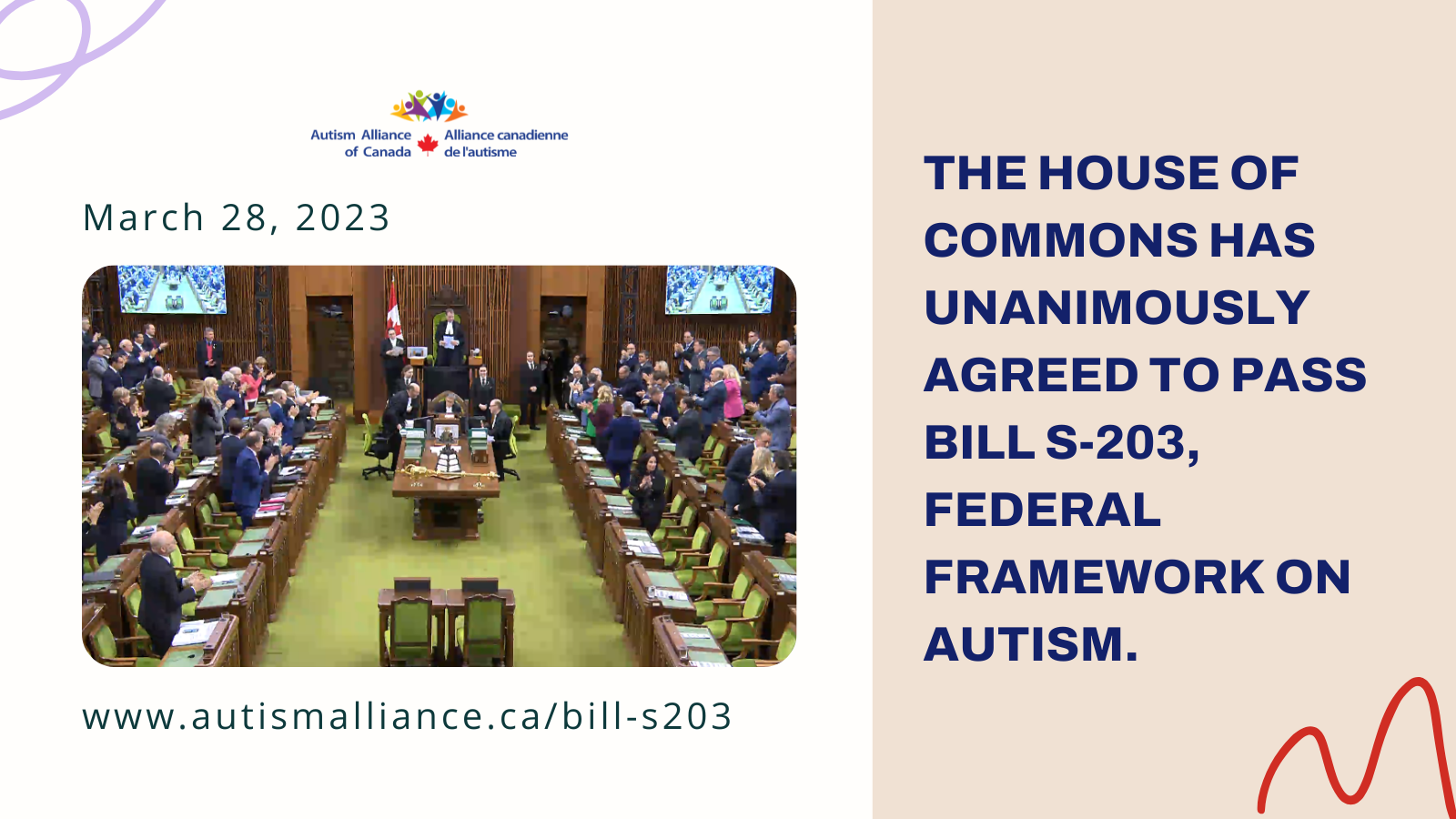
|
|
|
Upcoming Family Resource Centre Presentations




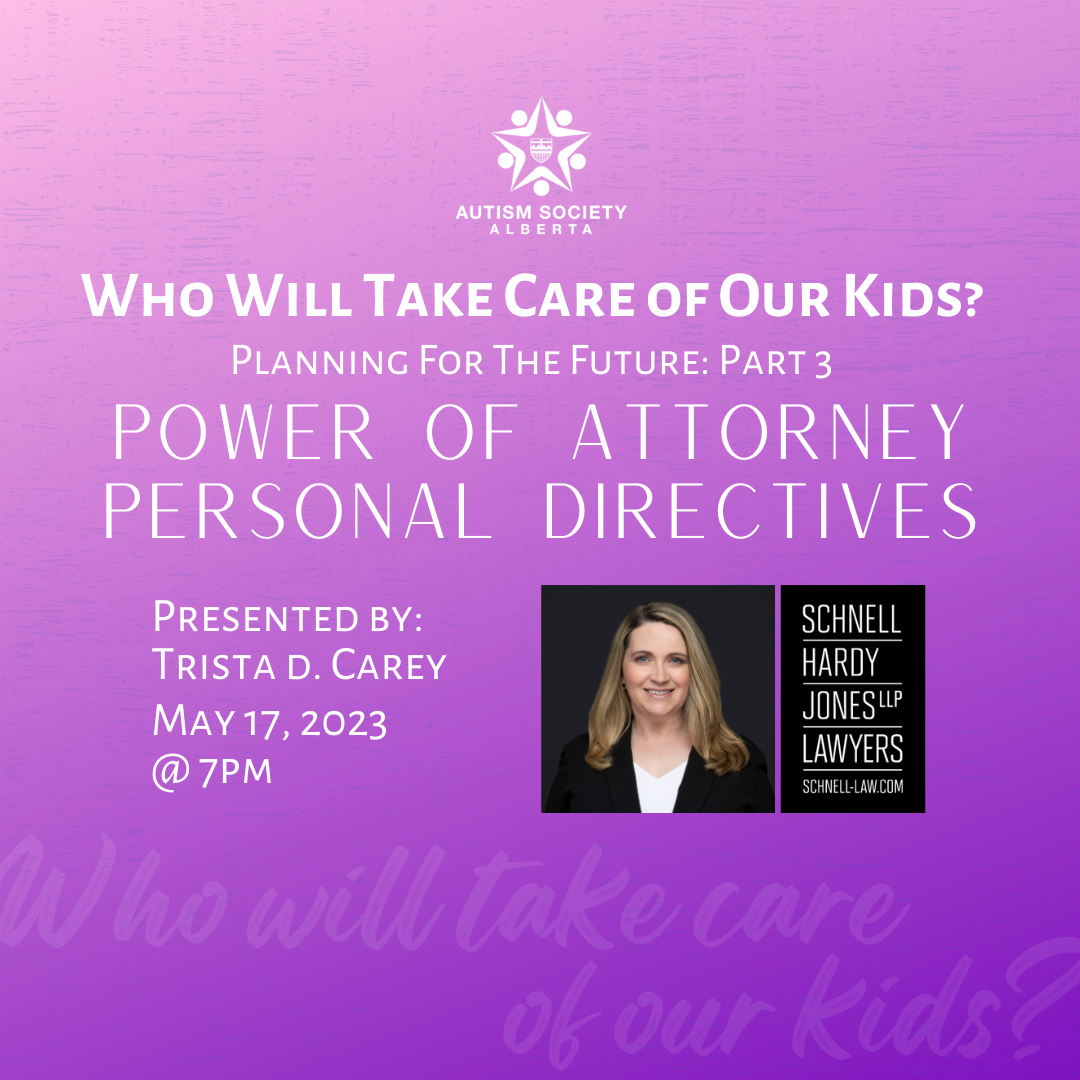
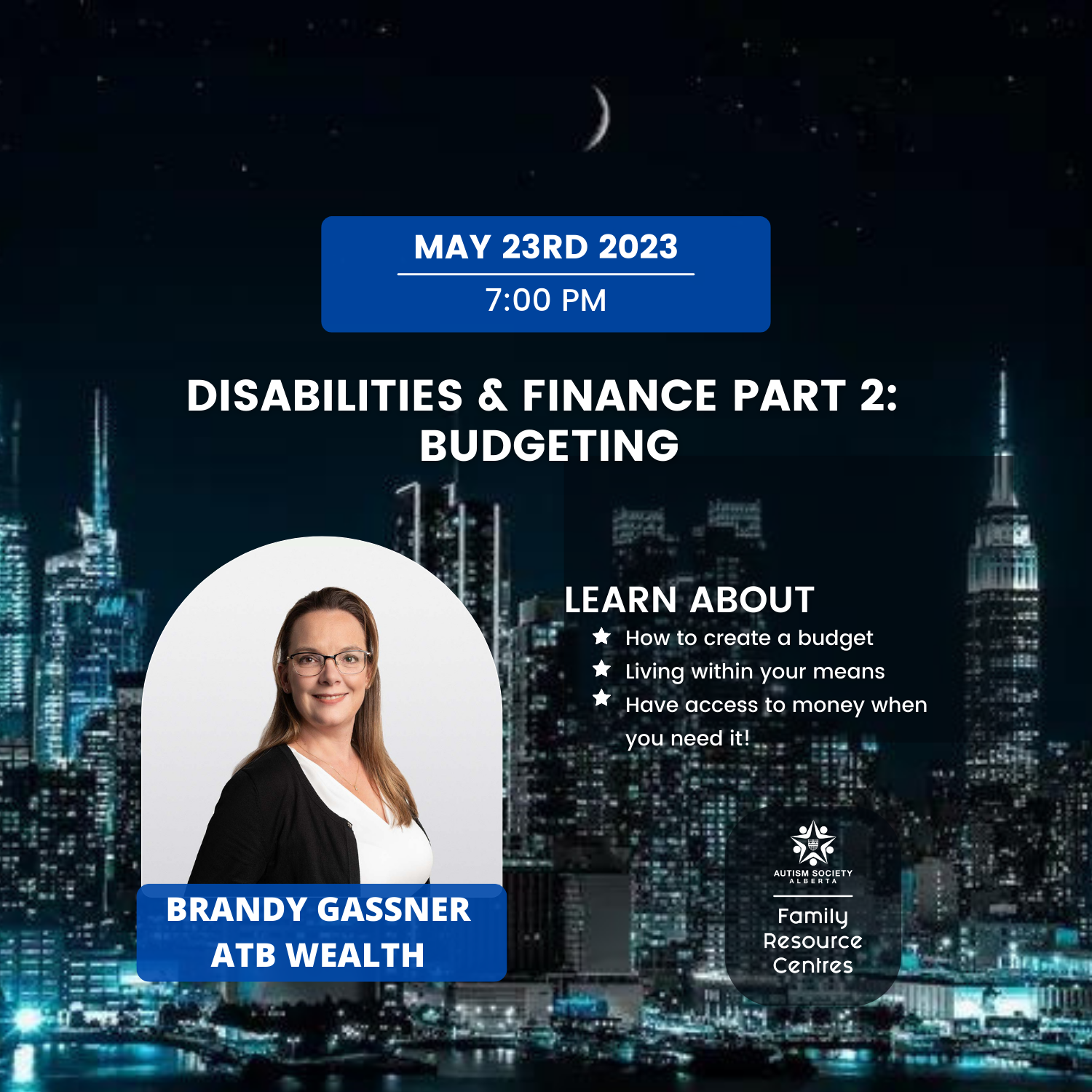

|
|
|
|
|